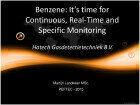Measurement and testing
Benzene it's Time for Continuous, Real-Time and Specific Monitoring - Presented at PEFTEC.
May 17 2016
Author: Mr Martijn P. Landweer MSc. on behalf of Hatech
Benzene is extremely hazardous and a recognized human carcinogen. Exposure to high concentrations in the 10,000 to 20,000 parts per million (ppm) range will result in death, whilst chronic exposure to ppm levels significantly increase the likelihood of leukemia. With the risk of either chronic or acute exposure, legislation has been put in place across the globe to ensure exposure is kept to a minimum, typically a TWA of 1ppm
In May 2014, the US Environmental Protection Agency (EPA) estimated that some five million Americans, not counting those with workplace exposures, face heightened cancer risks from benzene and 68 other carcinogens released into the air by the nation's 149 oil refineries. This is greater than a one in one million lifetime cancer risk Making it clear that the cancer and other health risks posed by petroleum refineries on nearby communities are unacceptable, monitoring and control of benzene concentration levels around the perimeter of all US oil refineries has been proposed by the US EPA under the 'Residual Risk Program'. The proposed rule would revise emission control requirements for flares, storage tanks and coking units at petroleum refineries and require monitoring around refineries to ensure that neighbouring communities are not being exposed to hazardous air pollution. This proposal would also set maximum achievable control technology standards for delayed coking units, which the EPA described as a "significant" unregulated source of hazardous pollutant emissions at refineries.
Sampling options for refinery perimeter monitoring vary depending on monitoring objectives. Recommendations range from placing samplers every 15° around the plant (25 sampling locations) to every 22.5° (16 sampling locations and every 40° (nine sampler locations). Additional sampling locations may also be required around satellite installations (if these are thought to be responsible for >10% of total refinery emissions), points upwind / downwind of the plant and / or in local centres of population - for example, nearby villages, schools, homes, etc. Fence-line sampling locations are typically deployed at evenly spaced angular intervals around the refinery perimeter.
Although there are instruments that have an adequate method of measuring benzene, they only provide a short term benzene measurement. The new EPA proposals under the Residual Risk Program and ever increasing awareness of the dangers of benzene exposure means that there is an urgent need for 24/7 continuous, benzene specific monitoring to ensure real-time protection of workforce, environment and plant.
There's no doubt that the international petrochemical industry should prepare itself for even closer scrutiny following the release of the previously secret documents by the CPI. There is still evidence of an elevation of risks of leukemia and lymphomas among occupational groups exposed to the chemical, as well as populations being polluted from these benzene sources. It is also highly likely the US EPA proposals on monitoring and control of benzene emissions around the boundaries of refineries will be implemented across Europe and the rest of the world. Global oil and chemical giants and the relevant trade associations now have the technology at their disposal for continuous, real-time benzene specific monitoring to ensure the ultimate long-term protection of workers, plant, the environment and local communities.
Digital Edition
PIN 26.1 Feb/Mar 2025
March 2025
Analytical Instrumentation - Elemental Analysis for Quality and Process Control at Refineries, for Lubricants and Wear Metals in Engine Oils - Synthetic Lubricants: New Developments - Scaling...
View all digital editions
Events
Apr 15 2025 Moscow, Russia
Apr 22 2025 Hammamet, Tunisia
Apr 22 2025 Kintex, South Korea
Solar & Energy Storage Summit 2025
Apr 23 2025 Denver, CO, USA
Apr 27 2025 Portland, OR, USA















